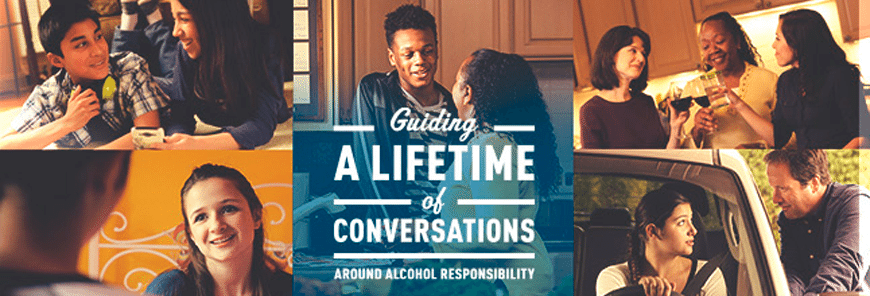
“When do I get to have a beer?” our almost ten year old daughter asked as we were standing in the line for $5 beers on a gorgeous first day of fall that also marked the last Washington Nationals game of the season. Looking her in the eyes, I said very matter of factly, “Alcohol is dangerous for growing bodies and against the law until you’re 21. Why?”
She shrugged her shoulders. “I don’t know,” she replied. “Just thought I’d ask. Can I have some coffee instead?”
![]()
The answer was still no but she was testing me, wondering what I would say in this particular situation in a place where alcohol is prevalent and often regarded as part of baseball culture along with peanuts and hot dogs. I could have shut her down with a simple “no” or a lecture but instead used the knowledge I had from working with Responsibility.org to start a conversation about alcohol at this early age. Responsibility.org’s resources empower parents to be confident about decisions regarding alcohol, modeling healthy and balanced behaviors, and also creating a foundation for starting conversations with their kids from an early age.
Why am I bringing up the topic of drinking when my kids are still in elementary school? Our kids have already started to ask us about alcohol. It’s a topic that comes up not only when we’re at sporting events but also out to dinner. As a fan of seizing teachable moments and having age appropriate conversations with kids about important topics, there’s no time like the present to talk to them about alcohol and underage drinking especially if they’re the ones bringing it up.
 At the #TalkEarly Summit I attended in August, we heard from Dr. Tony Wolf. Every time I hear Dr. Wolf speak, I appreciate his humor and non-judgemental ability to approach difficult topics in a matter of fact way that all parents can identify with. As the father of two grown children, he’s talked the talk and walked the walk with his own kids.
At the #TalkEarly Summit I attended in August, we heard from Dr. Tony Wolf. Every time I hear Dr. Wolf speak, I appreciate his humor and non-judgemental ability to approach difficult topics in a matter of fact way that all parents can identify with. As the father of two grown children, he’s talked the talk and walked the walk with his own kids.
Drawing on personal experience, Dr. Wolf is a big proponent of talking early because “we want them to have as much knowledge as needed once they get to the age where they are old enough to deal with these issues. We should start these conversations around the age of 9 years old.”

Talking about difficult topics like alcohol can be hard if your kids aren’t already bringing it up themselves. How do you start the conversations? Dr. Wolf provided these six tips:
- Make sure it isn’t a wonderful teaching moment just for you – it should be a conversation that results from spontaneous events
- It should be fairly short and swift, not a lecture because they glaze over
- The parent should have in her head what she wants to get across ie. drinking alcohol isn’t good for a growing body, growing brain or healthy lifestyle. Teens are invested in having a healthy life style.
- Be prepared for questions from kids like “why do people drink if it tastes gross?” or “Sandra said her brother drinks every weekend.”
- You want to be honest but decide in advance how revealing you want to be – be genuine
- Talk to them in an adult manner, not in the mommy/daddy voice
While it’s easy to talk to my kids now because they’re at an age when they’re receptive to information, I fully acknowledge that they won’t always want to hear what I have to say about alcohol or anything else.
According to Dr. Wolf, the teen years is when it becomes my job to “shut up and listen” when they talk. What other advice does Dr. Wolf have about talking to teens?
- It is an absolute fact that parents have significantly more influence on their kids
- Say to your teen what you think, ask them a quiz – they like quizzes – ask if the list applies to them
- Keep coming back to them – it’s not a one time conversation
- Don’t try to convince them, say “this is what I think and I care about you”
- Simple and short is better than lectures
- The secret in talking with your kids is to just “Shut UP” — your need to fill it with a teachable moment – let them feel they have been heard and that is also when they will hear you
- Kids will often talk about their friends, not what they do
- They hear you even when it doesn’t seem like they’re listening
- Supervise them as best you can, but know that if you are a wise parent, there is some stuff you can’t trust.
For more information about Responsibility.org’s Talk Early initiative and resources, visit their website.
As a blog ambassador for Responsibility.org, I am compensated for my involvement but all opinions are my own. Images courtesy of Responsibility.org.



So true that it is not a one and done conversation. Ellen